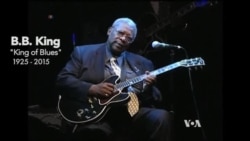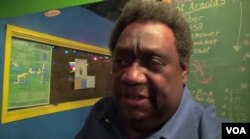Blues fans are mourning the passing of Riley B. King, better known as B.B. King, the singer, songwriter and guitarist who achieved fame as the "king of the blues." He died at his Las Vegas home Thursday at age 89 after an illness halted a tour and his performances last October.
Millions of fans will miss the bluesman, but his loss is most painful for those who knew him personally and worked with him.
Houston-based trumpeter and singer James "Boogaloo" Bolden has been with the B.B. King band since January 1980, serving as its leader and music director.
"Well, you know, B.B. was very nice and very considerate of everybody," Bolden said. "Working with him was a real pleasure. He always made sure that you and your family were taken care of, always."
According to Bolden, B.B. King’s transformation from a blues singer to an international star began with his crossover hit “The Thrill is Gone,” which won a Grammy Award in 1970. But the man’s exposure to a young, global audience began when he toured with the Irish rock group U2.
"We did a six-month tour with them in 1989, and after that there was a big, big change," Bolden said. "There was a big crossover. The audience started getting younger and younger."
Absorbed Delta blues
Riley B. King was born in Mississippi, where he was exposed to the Delta blues of the 1920s and 1930s. But he also listened to big band music and jazz on the radio, according to Blues Foundation CEO and President Jay Sieleman, speaking from his office in Memphis.
"He was more influenced by some of the more urbane and advanced guitar players, including jazz guys like Charlie Christian and Django Reinhardt," Sieleman said.
King got his first big break and his moniker while working for a Memphis radio station.
"He was a DJ on WDIA and had a 15-minute show," Sieleman said, "and he had to sell a product and he got a chance to tell people where he was playing, and that is where he picked up the name 'Beale Street Blues Boy,' eventually shortened to ‘B.B.’ And it all started right here in Memphis."
Ties to Houston and ‘chitlin’ circuit’
The next phase of King’s career had a Houston connection. He toured what was then known as the "chitlin' circuit" in Southern states at a time when segregation confined black players to small clubs that drew black audiences.
Roger Wood, author of “Down in Houston” and other books on the blues, said this helped King build his African-American fan base.
"His rise to prominence occurred during the years that he was booked by the Houston-based Buffalo Booking agency, which was an adjunct of Don Robey’s music empire," Wood said. Robey founded labels such as Peacock and Duke.
Embraced by folk, rock enthuiasts
By the time segregation ended in the mid-1960s, blues music had been given new life by folk music enthusiasts and by rock bands — in particular, British groups like the Rolling Stones. The Stones had King open for them on a 1969 concert tour.
Now, many musicians play the blues, but Wood said no one can replace B.B. King.
"It is not like the last bluesman has died, but the most prominent bluesman of our lifetime, an icon in the pop cultural sense," he said. King "will not be replaced by anyone."
Wood said King’s legacy would live on through musicians who continue to study and emulate his style and fans who will continue to listen to his lifetime of recordings.






